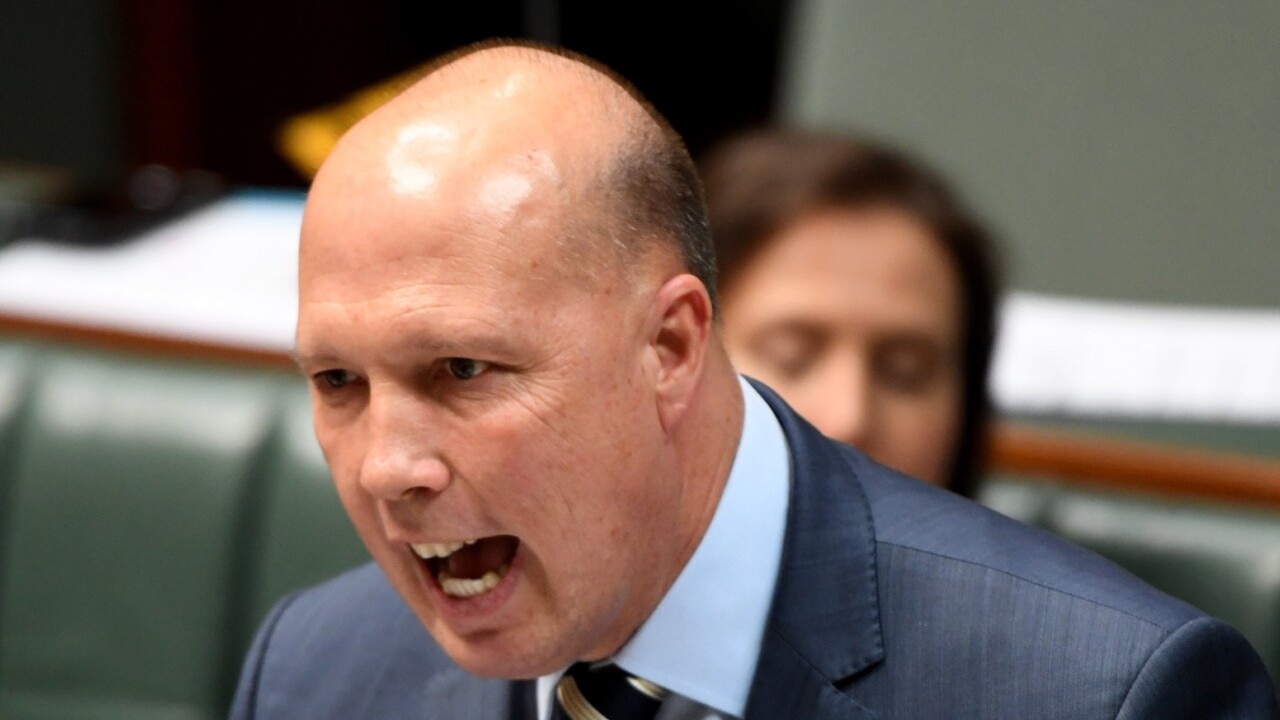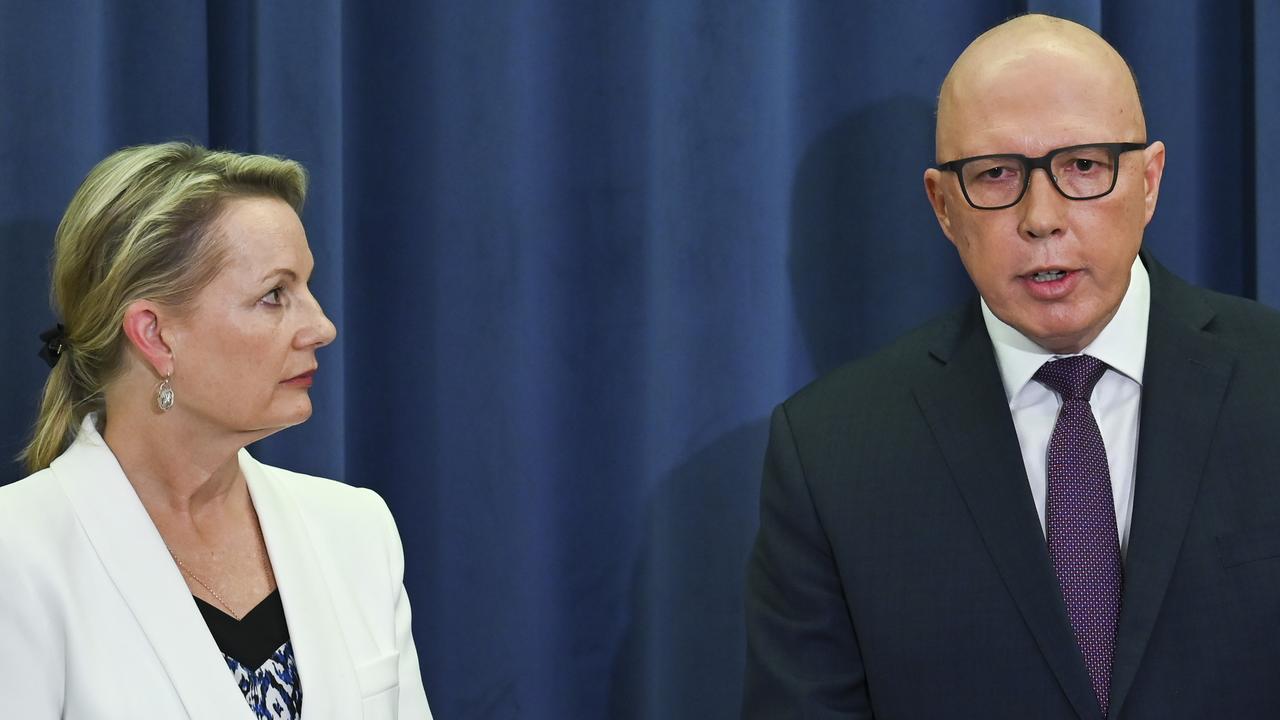Peter Dutton stands firm after Julian Leeser resigns from Liberal front bench over Voice decision
The Opposition Leader is holding firm on his Voice to parliament stance, despite new fractures emerging within the party.

Peter Dutton is standing firm on his party room’s decision to actively campaign against the Voice to parliament referendum – despite the resignation of a senior frontbencher.
Julian Leeser quit the shadow cabinet and his roles as shadow attorney-general and spokesperson for Indigenous affairs on Tuesday.
Mr Leeser – a constitutional conservative – has spent a decade working on making a Voice reality and said while the government’s model was not perfect, he would campaign in the “Yes” camp.
The Liberal Party last week decided to not back the proposed model, saying instead it wanted local and regional voices. The position is binding for Liberal frontbenchers, but backbenchers are – as is usual party room practice – able to cross the floor if they wish.
Mr Leeser now joins Tasmanian MP Bridget Archer and NSW Senator Andrew Bragg in breaking ranks with the party room, indicating they would actively support the “Yes” vote.
It follows former Indigenous affairs minister Ken Wyatt quitting the party, and the country’s most senior Liberal in office – Tasmanian Premier Jeremy Rockliff – stating his support for the Voice.

Mr Dutton said he supported Mr Leeser’s decision, and denied there was any “rancour” or bitterness.
He said the “overwhelming majority” of the Liberal Party supported the decision to go against the Voice, and that Mr Leeser’s departure from the frontbench wouldn’t change the party’s position.
“Our determination is to make sure that we have local and regional voice – as we want to listen to those people in the communities and get the best possible outcomes for them,” Mr Dutton said.
“The Prime Minister’s proposal, a Canberra Voice, will not deliver that outcome.
“The biggest constitutional change in our country’s history is being proposed here, and needs to be scrutinised.”
Mr Leeser also said he supported Mr Dutton as leader, but that on the issue “we find ourselves in different places”.
“People of goodwill can disagree,” he said.

Mr Leeser said while the proposal announced by Prime Minister Anthony Albanese wasn’t perfect, he could not vote against it.
“Almost 10 years ago, I sat down with a small group of constitutional conservatives and Indigenous leaders and worked on a proposal for constitutional recognition of Aboriginal and Torres Strait Islander Australians,” he said.
“The idea we developed was different, it was organic, it was consistent with our constitutional heritage and it was a uniquely Australian idea designed for Australian conditions. The proposal was called the Voice.
“I believe that the Voice can help move the dial on Indigenous education, health, housing, safety and economic development.”

He said he would spend the next few weeks actively campaigning for amendments to the proposal, warning the referendum risked failing if the government didn’t drop it’s “all or nothing” campaign.
Mr Leeser said he would be advancing his own Press Club model, referring to the ideas he set out at the National Press Club last week.
His proposal affirms the importance of local and regional bodies, as supported by the Coalition, but also achieves constitutional recognition “without symbolic language”. He said it leaves the scope and powers of the Voice completely to the Parliament.
“The Press Club model for the Voice is constitutionally sound, gives Aboriginal and Torres Strait Islander Australians a place in our founding document and recognises the supremacy of Parliament in our constitutional system. It improves the model put forward by the government and its Referendum Working Group,” he said.
Mr Leeser said clause two of the proposed amendment – which outlines the Voice can provide advice to “executive government” and not just Parliament, was one of the biggest risks to the referendum.
“These changes will deliver a Voice that is in every way constitutionally safe – a voice that honours Aboriginal and Torres Strait Islander Australians and gives them a place in our founding document,” he said.
“We must find common ground.”
He said even if his proposed amendments are not supported by the Albanese government, he would support the Voice anyway.
“I’m a supporter of the Voice; I think it’s right that it has a place in the constitution,” he said.
“I think, though, making those amendments puts the referendum on a better chance of success and has a better chance of convincing more Australians to support this.”

Mr Leeser’s decision has attracted praise from Labor and crossbenchers alike, as well as from two Liberal Party colleagues.
In a tweet following Mr Leeser’s announcement, Ms Archer – who represents the seat of Bass in Tasmania and has already made her intention to actively campaign “yes” – wrote she had “much respect for Julian Leeser”, adding that it showed “courage and integrity”.
Meanwhile, a statement from Senator Bragg confirmed he too would be campaigning with the “yes” camp, and congratulated Mr Leeser.
“He has invested a huge amount of his political capital in an issue which has been highly contested within the Liberal Party,” he said.
“Julian has always understood a successful referendum would be considerably more likely with liberal and conservative support.
“I want the referendum to be successful and I believe a ‘Yes’ vote is now more likely because of Julian’s conviction.
‘As Julian said in his statement, the immediate task is to engage deeply in the Committee process. There will be more to say about campaigning arrangements following the Committee process.”
Mr Albanese, currently on a week’s leave, tweeted his support for Mr Leeser’s decision.
“Julian Leeser has made a principled decision to campaign for a yes vote, like so many people from all sides of politics who are approaching this process in good faith,” he wrote.
“Peter Dutton has underestimated the number of Liberal and National voters who will show generosity and goodwill, and vote yes to constitutional recognition in this referendum.”
Indigenous Affairs Minister Linda Burney said Mr Leeser had “shown strength today in putting his principles ahead of politics”.
“It can’t have been easy for him to resign from the Shadow Cabinet,” she said.
“His decision reflects his long-held commitment to constitutional recognition through a Voice, and an understanding that this year’s referendum is a once-in-a-generation chance to make a real difference in the lives of Aboriginal and Torres Strait Islander people and help close the gap.”



